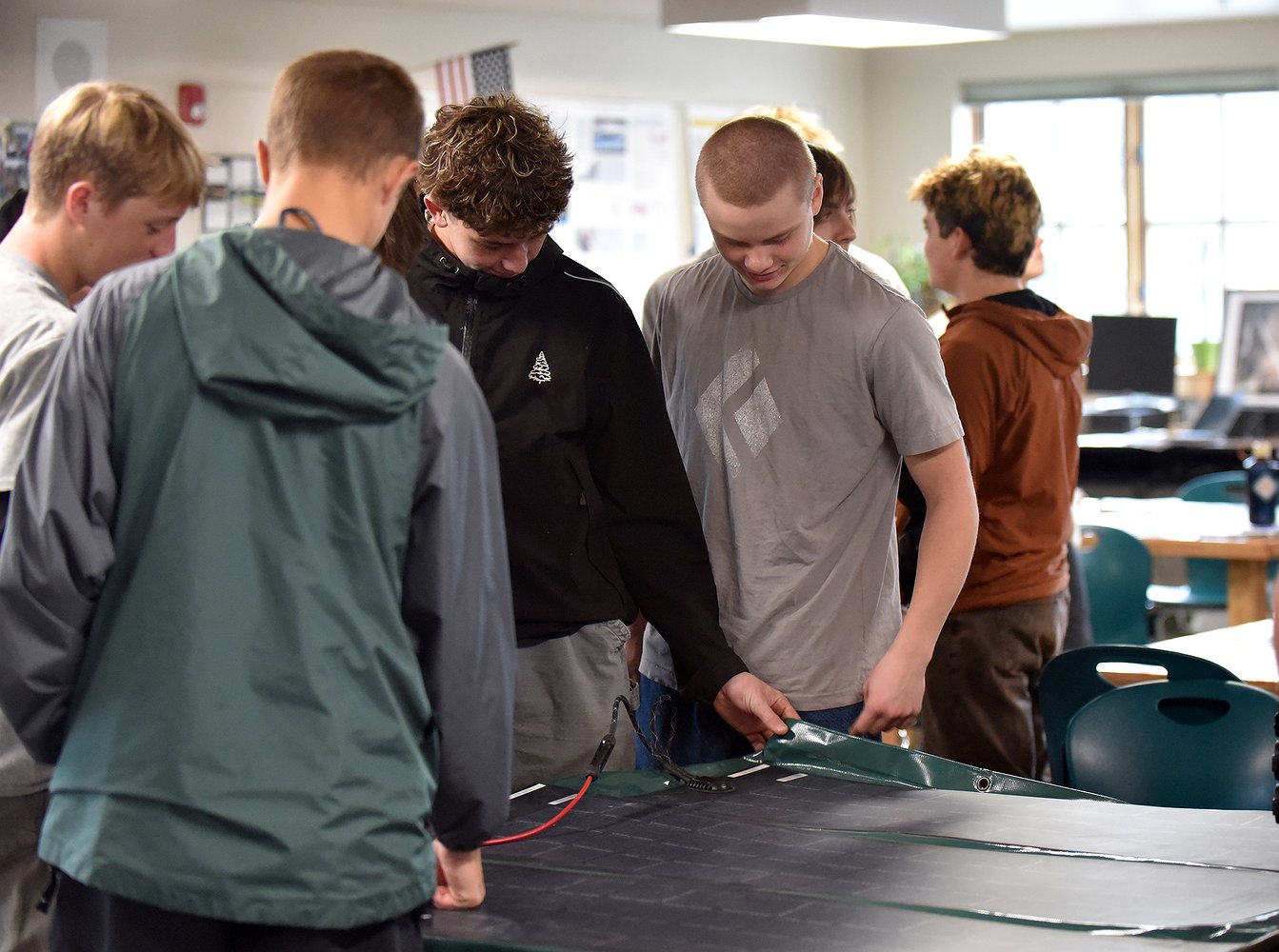Energy resilience featured in presentation to science class
Power Up Ukraine is a Rotary-led campaign that delivers mobile, lithium battery-powered, solar backup generators to hospitals, mobile clinics and humanitarian hubs across Ukraine.
Heidi Rickles, Ukraine Resilience Campaign Chairwoman, recently brought a team from Power Up Ukraine to Whitefish High School to talk about their technology and its applications. The students in Eric Sawtelle’s AP Environmental Science class were able to see the solar panels and generators up close.
Rickels, who is connected with The Rotary Club of Kalispell and other local clubs that support the Power Up campaign, said the presentation highlighted real-world applications of the students’ subject matter.
The team included Yuri Zinchenko, a Ukrainian lawyer, who took refuge in Whitefish in 2022 with his family. He collaborated with local Rotarians to launch the Power Up Ukraine campaign and was on hand to talk with students.
Ukrainian American Paul Shmotolokha, the CEO of New Use Electric (NUE), a company that creates and distributes tough, advanced mobile solar and battery generator systems that provide energy wherever it's needed, brought in gear for the kids to see and touch.
“This is what’s called a solar with a full battery backup system,” Shmotolokha said. “This is what runs a lot of operating rooms in Ukraine. When you plug it in, if the power goes off, it’ll work seamlessly.
“The word ‘resilience’ is what this is about. Energy resilience,” he added.
He said NUE provides clean, mobile energy to places experiencing emergencies, like wars and natural disasters. Shmotolokha has delivered generators to frontline hospitals, mobile clinics and humanitarian hubs in Ukraine.
“They can deliver direct. He's got guys going in in vests and helmets to deliver to frontline hospitals and maternity wards,” Rickles said. “[Shmotolokha] cut his teeth in U.S. disaster response.”
Shmotolokha’s son, Max, works in sales for NUE. He shared his passion for the science behind the generators and all of their uses.
“If you’ve ever hauled a diesel generator around, those things are really heavy,” Max said. “This (unit) is 70 pounds, so it’s not the lightest thing on planet Earth, but relatively, for the amount of juice it has and the battery it’s got in it, it’s pretty light.”
Max unfolded a lightweight solar panel about as big and thick as a throw blanket and said it was the equivalent of one of the modules on the roof of the Center for Sustainability and Entrepreneurship.
“In Ukraine, you can’t have glass panels because it's a military target,” Max explained.
He said another reason the portable panels are safe for use in Ukraine is because they emit no heat signature.
NUE has also taught people in Ukraine to make the generators, thus providing jobs and a reliable source of the tools that supply energy. Shotolokha said they’ve offered the course, which is taught by non-governmental organizations, in Puerto Rico and in Louisiana, and said high school students take the course.
In addition to providing energy to the victims of tornados and other disasters, NUE generators are also used in the entertainment industry and on commercial job sites. A movie director from Montana spoke with the students about how the portable generators are helpful on set.
Max said that typical diesel generators make too much noise when filming movies or music videos.
"The sound guy has to take out that noise and there are lots of cables,” he said.
After the presentation, students were able to interact with the generators and solar panels and ask questions. Rickles said when the students were asked about their future goals, several of them responded they would like to become mechanical engineers.
“Resilience is really our key word. Learning how to adapt and change, no matter what the challenge is,” Rickles said. “It's really about the next generation. Getting them inspired and thinking in new ways.”




